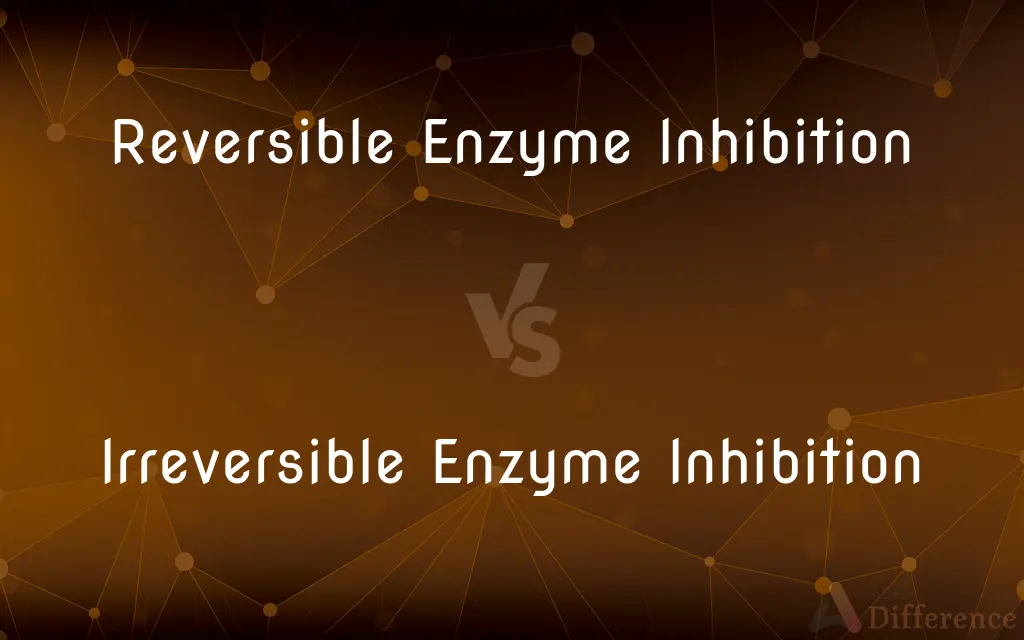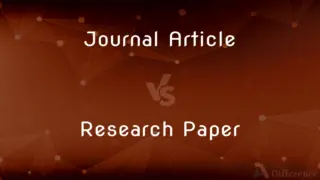Reversible Enzyme Inhibition vs. Irreversible Enzyme Inhibition — What's the Difference?
By Tayyaba Rehman — Published on January 14, 2024
Reversible inhibition is when an inhibitor temporarily binds to an enzyme; irreversible inhibition is when the binding is permanent, deactivating the enzyme.

Difference Between Reversible Enzyme Inhibition and Irreversible Enzyme Inhibition
Table of Contents
ADVERTISEMENT
Key Differences
Reversible enzyme inhibition occurs when an inhibitor molecule binds to an enzyme in a non-covalent and often competitive manner, allowing the removal of the inhibitor to restore enzyme activity. This type of inhibition is characterized by its temporary nature and the ability of the enzyme to return to its normal function once the inhibitor has been displaced or diluted out.
Irreversible enzyme inhibition, in contrast, involves covalent bonding between the inhibitor and the enzyme or a permanent alteration of the enzyme structure, leading to the permanent inactivation of the enzyme's activity. This form of inhibition typically results from a chemical reaction that permanently alters the active site or essential residues necessary for the enzyme's activity.
While reversible enzyme inhibitors act as a control mechanism and can be fine-tuned by varying the concentration of the inhibitor, irreversible inhibitors typically lead to the permanent loss of enzyme activity. Therefore, reversible inhibition is often preferable in therapeutic contexts to avoid long-term side effects associated with the permanent loss of an enzyme's function.
Irreversible enzyme inhibition often involves a one-time chemical modification that fundamentally changes the enzyme's active site, rendering it permanently inactive. On the other hand, reversible inhibition is characterized by a dynamic equilibrium between the enzyme, inhibitor, and enzyme-inhibitor complex, where the inhibitor can dissociate, leaving the enzyme unchanged.
In the context of pharmaceuticals, drugs that act as reversible enzyme inhibitors can offer a controlled and often safer therapeutic index. In contrast, drugs that act as irreversible inhibitors may provide a more robust and lasting effect but carry a higher risk of side effects due to their permanent inactivation of target enzymes.
ADVERTISEMENT
Comparison Chart
Bonding Nature
Non-covalent
Covalent
Duration of Effect
Temporary
Permanent
Recovery of Enzyme Activity
Possible upon inhibitor removal
Not possible
Impact on Enzyme Structure
Non-destructive
Often destructive
Usage in Therapeutics
Often preferred for control
Used for permanent inhibition
Compare with Definitions
Reversible Enzyme Inhibition
Enzyme inhibition that can be reversed by dilution or by the addition of an excess substrate.
Upon dilution, the reversible enzyme inhibition of the metabolic pathway was alleviated.
Irreversible Enzyme Inhibition
Enzyme activity that cannot be restored once the inhibitor has bound to the enzyme.
Irreversible enzyme inhibition of the pathogen's key enzyme halted its growth.
Reversible Enzyme Inhibition
Inhibition characterized by a reversible inhibitor binding to the active site or another site on the enzyme.
Allosteric inhibitors often lead to reversible enzyme inhibition, modulating enzyme activity without damaging the enzyme.
Irreversible Enzyme Inhibition
A permanent inactivation of an enzyme by an inhibitor that binds covalently.
Aspirin causes irreversible enzyme inhibition by covalently modifying COX enzymes.
Reversible Enzyme Inhibition
A temporary blockage of enzyme activity by an inhibitor that can be overcome.
High substrate concentration can overcome reversible enzyme inhibition.
Irreversible Enzyme Inhibition
The chemical modification of an enzyme, rendering it permanently inactive.
The irreversible enzyme inhibition was evidenced by the lack of enzyme activity even after extensive dialysis.
Reversible Enzyme Inhibition
The binding of an inhibitor to an enzyme in a way that does not permanently alter the enzyme's structure.
Reversible enzyme inhibition is essential in regulating biochemical pathways.
Irreversible Enzyme Inhibition
The inhibitor forms a stable, often covalent bond with the enzyme, leading to a lasting deactivation.
The pesticide irreversibly inhibits acetylcholinesterase, preventing it from breaking down acetylcholine.
Reversible Enzyme Inhibition
A process where an inhibitor can detach from an enzyme, restoring enzyme function.
Competitive inhibitors cause reversible enzyme inhibition, competing with the substrate for the active site.
Irreversible Enzyme Inhibition
An inhibitor binds irreversibly to the active site, permanently blocking substrate access.
The drug acts through irreversible enzyme inhibition, permanently blocking the viral protease.
Common Curiosities
Can the effects of irreversible enzyme inhibition be reversed?
No, once the enzyme is inactivated, it cannot be reactivated.
What is reversible enzyme inhibition?
It's when an inhibitor binds temporarily to an enzyme, allowing for the future restoration of the enzyme's activity.
Is irreversible enzyme inhibition typically used in therapeutic drugs?
It can be used but is less common due to potential for long-term side effects.
What's a common example of a drug that causes reversible enzyme inhibition?
Many blood pressure medications, such as ACE inhibitors, are reversible inhibitors.
What is the primary risk associated with irreversible enzyme inhibitors as drugs?
They can cause permanent side effects by inactivating enzymes necessary for health.
What is irreversible enzyme inhibition?
It's when an inhibitor permanently inactivates an enzyme through covalent bonding or structural modification.
How do irreversible enzyme inhibitors affect enzyme kinetics?
They permanently decrease the number of active enzymes, reducing the maximum rate of reaction (Vmax).
Can reversible enzyme inhibition be overcome by increasing substrate concentration?
Yes, especially in the case of competitive inhibitors.
How does reversible enzyme inhibition regulate metabolic pathways?
It acts as a feedback mechanism, where inhibitors can bind to enzymes to decrease their activity when needed.
Is the binding of reversible enzyme inhibitors concentration-dependent?
Yes, higher concentrations of reversible inhibitors will lead to more significant enzyme inhibition.
Can irreversible enzyme inhibition be detected in enzyme assays?
Yes, it is indicated by a lack of enzyme activity even after the inhibitor is removed.
Are enzymes that have been irreversibly inhibited always degraded by the cell?
Not always, but cells often recognize and degrade nonfunctional enzymes.
Are irreversible enzyme inhibitors used as drugs?
Yes, they are used when a permanent inhibition is necessary, such as in the case of some antibiotics.
Are reversible enzyme inhibitors considered safer than irreversible ones?
Generally, yes, because their effects can be reversed.
Can the effects of reversible enzyme inhibition be seen immediately?
Yes, the effects are typically immediate but also reversible.
Share Your Discovery

Previous Comparison
Journal Article vs. Research Paper
Next Comparison
Local Variable vs. Global VariableAuthor Spotlight
Written by
Tayyaba RehmanTayyaba Rehman is a distinguished writer, currently serving as a primary contributor to askdifference.com. As a researcher in semantics and etymology, Tayyaba's passion for the complexity of languages and their distinctions has found a perfect home on the platform. Tayyaba delves into the intricacies of language, distinguishing between commonly confused words and phrases, thereby providing clarity for readers worldwide.














































